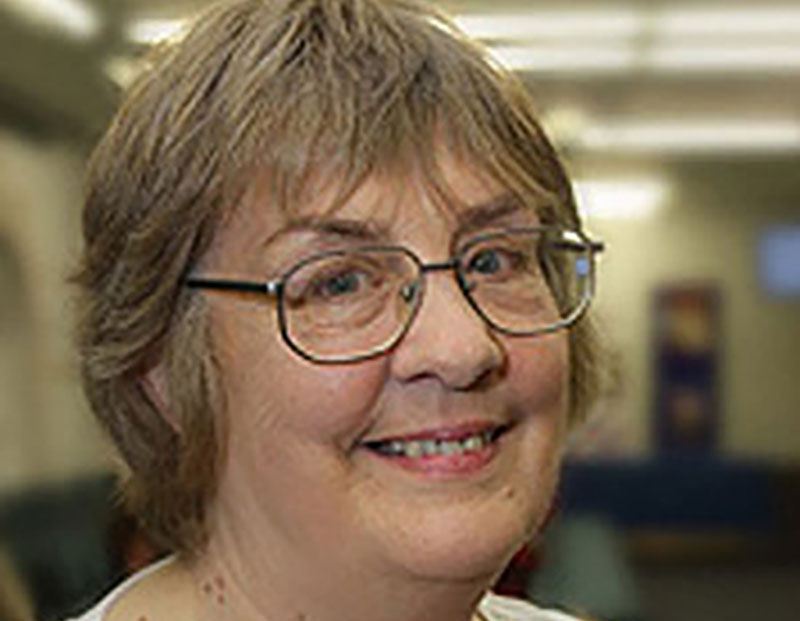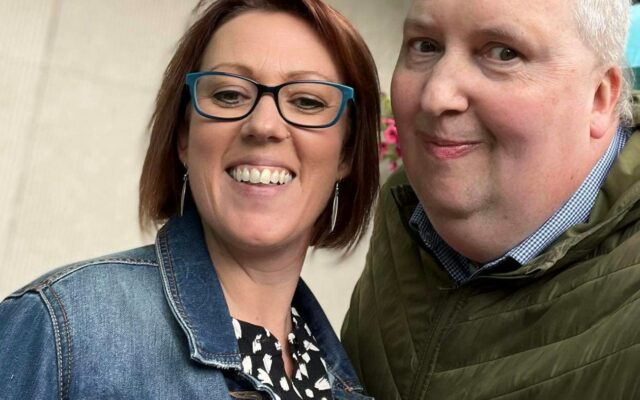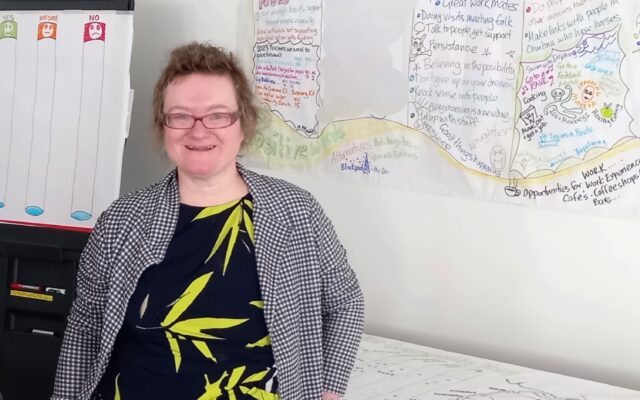I first met Elinor when I was CEO at the Elfrida Society, an early supporter and sponsor of the magazine. In 2005 it was decided that Elfrida would take on the publishing of Community Living. As part of the process I asked Elinor about contingency plans for producing the magazine if she should become ill. I think I imagined a journalist friend who might step in as editor at short notice. Elinor gave me a stern look which quickly helped me understand that, for her, becoming ill was not on the cards – or perhaps the message was that if she did become ill she would just continue. It was clear that she did not consider this an ordinary job where you could ring in sick – this was a commitment of body and soul. I pictured her with all four limbs encased in plaster like some television comedy casualty, still dictating her editorial to a young reporter with a notebook. Luckily, that never came to pass and she has carried on producing the magazine quarterly for a full three decades.
Elinor lives with her two rescue dogs, Heidi and Kit, in the lovely village of Dunster near the Somerset coast.  Along with my wife, Mary, I took up a long-standing invitation to visit her and to hear her story first-hand.
Along with my wife, Mary, I took up a long-standing invitation to visit her and to hear her story first-hand.
“Who wrote this rubbish?”
The first seeds of Community Living were planted when Elinor was working for Community Care magazine in 1979. The editor asked her to go to Huyton, where there was a home for people with learning difficulties run by a religious order. She wrote an article which, she says, “was about how lovely it was and how happy the people were.” The editor seemed pleased and the story ran. She didn’t get any feedback… except a phone call from David Brandon. A colleague took the call but she could hear him from some distance away. The gist of it was: “Who wrote this rubbish?”
“That was my first introduction to David and it was a wake-up call,” she says.
Elinor felt she would like to do something to address the issues that people with learning difficulties were facing. Then in 1987 the moment was right. She had already started a speech therapy magazine (Speech Therapy In Practice which she later sold) under the house name of Hexagon Publishing. Now she wanted to start a campaigning magazine for people with learning difficulties and she knew who she wanted to be the editor. David Brandon and Elinor met in a very noisy café on Birmingham Station. He had travelled from Preston and Elinor from London. “I asked him if he was interested in editing this and he said, ‘Yes’. It was quite a niche thing at the time because a lot of services were still being run in a very traditional way.” I suggest that it was brave to turn a fierce critic into an ally. “Yes, I suppose you could say that,” she laughs, “but his criticism was justified.”
Community Living magazine launched in April 1987. There was nothing like it and the number of subscribers shot up during the first few years. When David Brandon became busier with other things Elinor became the editor, but he remained involved.
Better design
In 1999 Elinor met Christina Schwabenland, CEO of the Elfrida Society based in Islington. This led to the Elfrida Society giving financial support to the magazine as well as contributing articles. After a couple of years the Elfrida Society took over the publishing of the magazine. An Editorial Advisory Board was established gathering other charities and individuals. An external designer introduced better design and use of colour – superficial changes perhaps but ones that undeniably appealed to an increasingly sophisticated readership. Elinor says: “We got good articles from Elfrida people. I now had an editorial board which was great. I was getting proper support and very useful input from people who really knew what was going on and were doing the sort of things we wanted to publicise in the magazine. It was a very good period.” On the other hand, she was not the sole owner or decision-maker any more.“That was quite a hard thing to learn. So I had that dual feeling about it.”
Meanwhile Andrew Holman had become the editor of Community Living. Elinor says, “Andrew took a leading role in the magazine in the late 1990s and early 2000s. He was a strong supporter of people with learning difficulties. As well as his keen interest in politics he did a great deal to promote the idea of direct payments.” After a couple of years Andrew developed his own company, Inspired Services, and Elinor became editor again, although Andrew continued to write perceptive pieces for the magazine until recently.
Campaigning
As time went by other organisations such as KeyRing, Integrate (Preston & Chorley), Respond, Three Cs, Linkability and UCLAN joined the editorial board and became sponsors of the magazine. Then in 2011 the publishing role was taken over by a specially created charity called CL Initiatives Ltd, chaired by Rosemary Trustam.
Community Living describes itself as a campaigning magazine. Does she feel it has helped change the world? She is wary of claiming that, since change was happening anyway, but says, “We have given people with learning difficulties a voice in the magazine and promoted the whole self-advocacy movement. I think we do that more strongly than others.”
A more recent focus is on social care law which Elinor says Rosemary Trustam has brought to the magazine. Legal expert Belinda Schwehr has been writing articles in every issue and leading seminars. Elinor says, “It is campaigning because she is trying to get people to understand their legal rights and when they can use the law and when they can’t. With our annual seminars it has been an important part of what the magazine has done over the last few years.”
Community Living is also supporting moves to get people out of institutions. “It’s a vital campaign and we are adding our voice to it,” she says.
Underdog
Have people’s lives changed for the better? Elinor refers to the Valuing People survey in the last issue: “It’s fairly clear that some people have benefited but an awful lot have not. Valuing People was like the ultimate postcode lottery in that some authorities got hold of it and took it forward but others didn’t.“ She is worried that some local authorities may be saving money with congregated services. “We might be going back to that because of the way that local authorities are making their cuts.”
I comment that she has spent 30 years rather selflessly promoting the rights of a group of people of which she is not a member. “It’s that English thing of supporting the underdog. It has been a very satisfying job. A magazine gives you a bit of power to influence things. Maybe it’s more a matter of confirming people’s views, developing a partnership with the readers. If the magazine is saying something that people want to do but feel worried about, perhaps the magazine endorsing it gives them a bit more confidence?”
Over the years, the magazine has had its ups and down as well as stiff competition from other publications. It has outlasted Community Connecting and Learning Disability Today magazine. I suggest just surviving is a success. She agrees. “I said to Gill Levy (an editorial adviser) our theme song should be I will survive!
Progressive impact
Elinor tells me she is confident that the magazine will thrive under the new editor Simon Jarrett, saying: “His values are those I have always tried to follow and he has demonstrated his editorial skills as arts correspondent. She also pays tribute to all current (and past) members of the Editorial Board and trustees of the charity. “I would single out Gill Levy who has supported the magazine since day one”.
So perhaps it is appropriate to finish with Gill’s own recent message to Elinor. Her words take us back to the impact that the magazine made on progressive staff in the early days:
“It was absolutely wonderful to receive the very first edition. It included so many of the issues I was struggling with in my new job at RNIB working with staff and carers of adults with learning difficulties and complex needs. The magazine challenged me to think in different ways and really helped me to move from local authority social work with children with learning difficulties to providing a service which sought to provide advocacy and campaign in a variety of settings.”
There it is again, the advocacy word. Autonomy and advocacy are the magazine’s watchwords. Let’s always remember them. Thank goodness and thank you Elinor Harbridge for ensuring that Community Living magazine is still here to make sure we do.
Note: Elinor will be retaining her link with Community Living and continuing as consultant editor. You can stay in touch with her on her website: www.hexagoneditorial.co.uk





